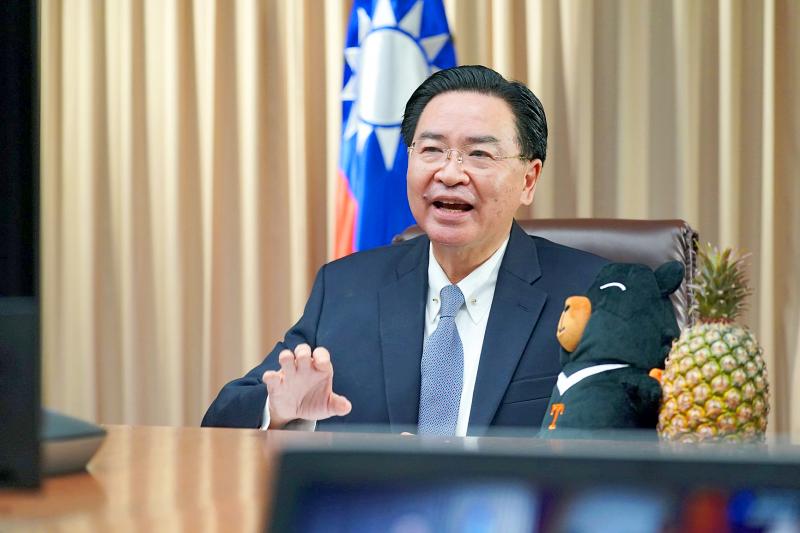Minister of Foreign Affairs Joseph Wu (吳釗燮) has been invited by the Inter-Parliamentary Alliance on China, an international cross-party group of legislators, to its meeting in Rome on Friday next week, the alliance said on Monday.
“Representatives from the Inter-Parliamentary Alliance on China (IPAC) — a body of some 200 global parliamentarians — will gather in Rome to stage a counter-meeting ahead of the G20 Leaders Summit to demand a tougher stance towards the Chinese government,” the group said in a statement.
The conference “will see parliamentarians from five continents meet with prominent leaders of groups targeted by the Chinese government, including Taiwanese Foreign Minister Joseph Wu, Sikyong of the Central Tibetan Administration Penpa Tsering, former Hong Kong legislator Nathan Law [羅冠聰] and Uyghur artist and activist Rahima Mahmut,” it said.

Photo: screengrab from the Internet
The Rome conference would be the first time that IPAC holds an in-person meeting since its launch in June last year, it said.
“Earlier this year the Chinese government imposed travel bans and other sanctions on nine IPAC members, including former UK Conservative leader Sir Iain Duncan Smith MP, Belgian Green MP Samuel Cogolati, EPP MEP Miriam Lexmann and Lithuanian Social Democratic MP Dovile Sakaliene — all of whom will be present at the Rome conference,” it said.
In Taipei, Ministry of Foreign Affairs spokeswoman Joanne Ou (歐江安) told a news briefing that the ministry is deliberating details about Wu’s visit to Europe, without confirming whether he would attend the meeting in person.
The ministry would share more information with the public once a decision is confirmed, Ou said.
IPAC is composed of the parliaments of 19 countries, spanning five continents and includes the European Parliament, she added.
It aims to promote cooperation among like-minded parliaments to push China to respect international regulations, global security and human rights through legislation, she said.
The alliance has repeatedly expressed its concern over Beijing’s verbal and military coercion of Taiwan, and its infringements on democracy, human rights and freedom, she said.
It has also voiced support for Taiwan to join the WHO and for Lithuania to develop ties with Taiwan by posting videos on Twitter, Ou said.
Aside from the meeting in Rome, Wu might attend a meeting in Prague on Wednesday and Thursday next week, according to a resolution passed by the Czech Parliament’s Committee on Foreign Affairs, Defense and Security last week.
However, the foreign ministry has yet to confirm Wu’s visit to the Czech Republic, although it has said Wu did receive an invitation from the country.
Meanwhile, a delegation of more than 65 people led by National Development Council Minister Kung Ming-hsin (龔明鑫) and Minister of Science and Technology Wu Tsung-tsong (吳政忠) is to visit Slovakia, the Czech Republic and Lithuania from today until Saturday next week.
Asked about media reports that a delegation from the European Parliament plans to visit Taiwan for discussions about disinformation next month, Ou said the ministry has no information to offer at present, but Taiwan would continue to deepen relations with the EU and its member states through various means.

SECURITY: As China is ‘reshaping’ Hong Kong’s population, Taiwan must raise the eligibility threshold for applications from Hong Kongers, Chiu Chui-cheng said When Hong Kong and Macau citizens apply for residency in Taiwan, it would be under a new category that includes a “national security observation period,” Mainland Affairs Council (MAC) Minister Chiu Chui-cheng (邱垂正) said yesterday. President William Lai (賴清德) on March 13 announced 17 strategies to counter China’s aggression toward Taiwan, including incorporating national security considerations into the review process for residency applications from Hong Kong and Macau citizens. The situation in Hong Kong is constantly changing, Chiu said to media yesterday on the sidelines of the Taipei Technology Run hosted by the Taipei Neihu Technology Park Development Association. With

A US Marine Corps regiment equipped with Naval Strike Missiles (NSM) is set to participate in the upcoming Balikatan 25 exercise in the Luzon Strait, marking the system’s first-ever deployment in the Philippines. US and Philippine officials have separately confirmed that the Navy Marine Expeditionary Ship Interdiction System (NMESIS) — the mobile launch platform for the Naval Strike Missile — would take part in the joint exercise. The missiles are being deployed to “a strategic first island chain chokepoint” in the waters between Taiwan proper and the Philippines, US-based Naval News reported. “The Luzon Strait and Bashi Channel represent a critical access

‘FORM OF PROTEST’: The German Institute Taipei said it was ‘shocked’ to see Nazi symbolism used in connection with political aims as it condemned the incident Sung Chien-liang (宋建樑), who led efforts to recall Democratic Progressive Party (DPP) Legislator Lee Kun-cheng (李坤城), was released on bail of NT$80,000 yesterday amid an outcry over a Nazi armband he wore to questioning the night before. Sung arrived at the New Taipei City District Prosecutors’ Office for questioning in a recall petition forgery case on Tuesday night wearing a red armband bearing a swastika, carrying a copy of Adolf Hitler’s Mein Kampf and giving a Nazi salute. Sung left the building at 1:15am without the armband and apparently covering the book with a coat. This is a serious international scandal and Chinese

COUNTERINTELLIGENCE TRAINING: The ministry said 87.5 percent of the apprehended Chinese agents were reported by service members they tried to lure into becoming spies Taiwanese organized crime, illegal money lenders, temples and civic groups are complicit in Beijing’s infiltration of the armed forces, the Ministry of National Defense (MND) said in a report yesterday. Retired service members who had been turned to Beijing’s cause mainly relied on those channels to infiltrate the Taiwanese military, according to the report to be submitted to lawmakers ahead of tomorrow’s hearing on Chinese espionage in the military. Chinese intelligence typically used blackmail, Internet-based communications, bribery or debts to loan sharks to leverage active service personnel to do its bidding, it said. China’s main goals are to collect intelligence, and develop a